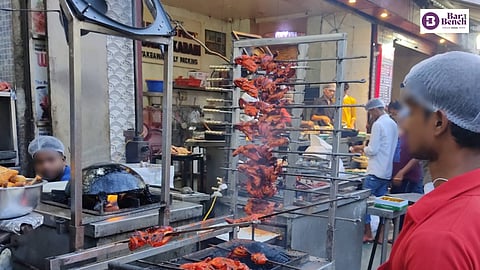
- Latest Legal News
- News
- Dealstreet
- Viewpoint
- Columns
- Interviews
- Law School
- Legal Jobs
- हिंदी
- ಕನ್ನಡ

The Bombay High Court on Wednesday said that there is no law which mandates that slaughterhouses must be closed for nine days during Jain festival of Paryushan Parv.
A Bench of Chief Justice Alok Aradhe and Justice Sandeep Marne made the observation while hearing a writ petition filed by Jain petitioners seeking closure of slaughter houses for 9 days for Paryushan Parv, a Jain observance.
The Court said that it cannot issue a writ of Mandamus to any State authority since there is no law or rule to the effect that slaughterhouses must be closed during the Jain festival.
"You are seeking Manadamus. For that, there have to be mandate in law. Where is the law? Where does it say that that slaughter houses must be closed for 10 days?" the Bench asked.
The Court pointed out that the present case was different from the Hinsa Virodhak Sangh case wherein the Supreme Court had upheld a decision of the Ahmedabad Municipal Corporation to close down slaughter houses during the Jain festival.
"You will appreciate the difficulty. In Ahmedabad the corporation had taken a decision. But (in this case), there is no legislative mandate, no rule, no law, policy, no legally enforceable right that they must close. Where is that obligation? You understand the distinction," the Court remarked.
In the previous hearing, the court had directed the Brihanmumbai Municipal Corporation (BMC) to consider the community’s representation after its initial decision to allow only a one-day closure during Paryushan.
Following this, the BMC, in an order dated August 14, extended the closure to two days, August 24 and August 27 (the latter also being Ganesh Chaturthi).
Unhappy with this, the petitioners returned to court, insisting on a full nine-day closure for the duration of the festival, which begins today.
Appearing for the petitioners, advocate Abhinav Chandrachud argued that Mumbai has a larger Jain population than Ahmedabad and that the BMC had failed to take this into account.
He cited the Hinsa Virodhak Sangh ruling to argue that such a closure is not unconstitutional and does not violate fundamental rights. He clarified that the plea does not extend to fish or seafood.
Senior Advocate Prasad Dhakephalkar, also representing the petitioners, contended that the BMC had disproportionately considered the preferences of the non-vegetarian population, despite a majority of Mumbaikars being vegetarians.
He also pointed out that even Emperor Akbar had issued a fatwa prohibiting slaughter during Paryushan whereas its difficult to get a similar order from BMC.
However, the court maintained that the Ahmedabad case involved a decision taken by the municipal corporation itself, not one imposed by judicial direction by a court.
"You understand the distinction," the bench said, reiterating that there must be an underlying law for the Court to intervene.
The Court suggested that if the petitioners believed the BMC’s decision was made without considering relevant facts or applying its mind, they should amend the plea to challenge that order instead of filing a writ petition.
Therefore, the matter was adjourned for two weeks to allow time to the petitioner to amend the plea. The Court also issued notice to BMC.